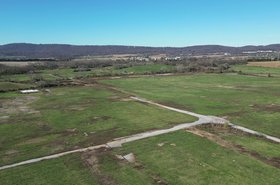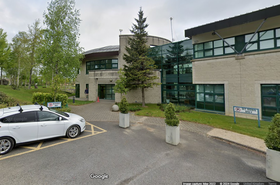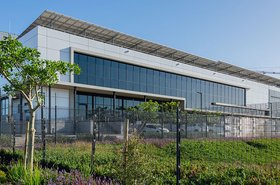The Maryland Public Services Commission just dealt a savage blow to the use of diesels for data center backup.
The state has offered generous tax incentives to bring data centers across the border from the overcrowded hub at Loudoun County in neighboring Virginia. But it's not prepared to have them at a large cost to the environment.
Aligned is the first company to buy space on the 2GW Quantum Loophole site in Adamstown, Frederick County. It applied to have 168 diesel generators, each with 3MW generating capacity for backup, and State staff recommended the Commission should nod that past the environmental laws, with an exemption on grounds of "public convenience and necessity."
Instead, after a swift grilling, the Commission told Aligned that diesel generators are not an acceptable form of backup in 2023, and advised the company to come back with a better option.
No alignment on backup power
The commission pulled no punches. Aligned expected each generator to be exempted separately, but admitted to Commissioner Bonnie Suchman that, in the event of a full-scale outage at the park, they would operate as one.
Suchman said that this constituted a single 504MW power plant: "I'm having a lot of trouble understanding staff's position that these are separate entities. To me, this is a power plant on your system. It just looks a little bit different than the traditional central station plant"
"I don't understand, in 2023 why you're proposing a 504-megawatt diesel generator," she said, and told Aligned to come back with different backup plans, "because I know that there are other data centers that are doing much more responsible backup generation than what is being proposed here."
That's the nub of this issue. In the last couple of years, the data center industry has hit on diesel generators as the next step in its decarbonization story. No matter that diesels are rarely switched on, a number of operators have seen an opportunity to win green kudos by switching over to less polluting alternatives.
These alternatives include using fuel cells, exemplified by Microsoft which created a hydrogen-fueled backup system that could replace a 3MW generator.
They also include hydrogen-powered turbines, and biofuels for diesels, including hydrotreated vegetable oil (HVO).
Diesel replacement - promise and reality
The industry wants credit for its environmental initiatives, and publicity for these projects has reached the Maryland Commissioners. In particular, Suchman saw a report (possibly this one), in which Aligned boasted of the environmental gains of a microgrid at its facility in Plano, Texas.
Former Aligned CEO Jacob Carnemark, now at PowerSecure, has installed a microgrid at the Aligned Data Centers site in Plano, Texas, and in a video, he claims it "emits one-tenth of the particulates of conventional backup generators," and is “one of the most sustainable data centers on the planet,” thanks to its energy efficiency and ability to coordinate with the grid during peak load times.
"I read an article on the Internet where your company was touting the choice that they made, because the environmental impacts would be less than straight diesel generator backup," said Suchman. "I'm asking you why it is that you could do it better in Texas, but you can't do it better here."
Aligned's director of data center engineering Rick Sparkman told Suchman that other options "were just not technically or economically feasible for this project" because alternatives such as fuel cells and gas turbines could not be switched on quickly enough to take over the load from batteries in the UPS, which were sized to handle it for less than a minute.
Sparkman also attempted to convince the Commission that the backup would never be used for any significant time, but Suchman was not reassured. Extreme weather events are becoming more common, and are increasingly likely to create situations where data centers must run on backup for days or weeks - as happened in Texas during the winter of 2021.
Diesel becomes a liability
Aligned says this is a setback for diesels at its Quantum Loophole project, rather than game over.
Power plants in Maryland normally have to be approved, and new diesels have to be justified, and granted a Certificate of Public Convenience and Necessity (CPCN). In most cases, small individual backup generators whose power is entirely consumed on-site are granted an exemption without much discussion. The State's staff had advised that each individual generator would be eligible for an exemption, and that's what Aligned expected.
The Maryland Commission declined to give the fleet of generators an exemption and directed Aligned to the CPCN process if it wants to continue applying to install that many generators.
“Aligned’s application to install generators was not denied," said a statement from Aligned. "What was denied was the exemption from the CPCN process, which means that the PSC commissioners want Aligned to go through the CPCN process. The PSC simply decided who – among the PSC, MDE and Frederick County – will make decisions regarding siting and air permitting once an application is submitted."
True enough. The Commission has assured DCD that the CPCN process is not pre-judged based on the rejection of an exemption. So Aligned can apply and argue for permission.
However, the CPCN process costs $10,000 to enter. It also includes a mandatory public hearing which would once again air the arguments about whether 168 diesels make up a 504MW power plant. Perhaps most significantly, it would take nine to 12 months to complete - altering Aligned's schedules substantially.
Aligned has not said whether it intends to apply for a CPCN, or look for an alternative backup technology, saying: "We do not have any comments on next steps at this time.”
Whatever the company does, this ruling from Maryland is a strong message to anyone planning to use diesels for backup in a jurisdiction which has a strategy towards reducing its environmental footprint.
Suchman told Aligned that environmental responsibility was a requirement for Maryland's Public Services Commission: "That's part of our mandate. When developers come to us asking for approval or an exemption of a certificate, part of the consideration is the environmental impact. And I can tell you that diesel generators are about the worst choice that you can make right now, even if it's for backup, and there are lots of other choices that your company has made in other states, and I'm not understanding why those decisions weren't made better here."
Commissioner Tony O'Donnell said: "We're in a new world. I don't think any entity could come into Maryland right now, ask for a 504MW diesel generator and get it approved. I just don't believe that's possible."
The data center community's claims for green backup mean that other jurisdictions will be saying the same thing.
Diesel backup in a big project just became a major risk factor.





